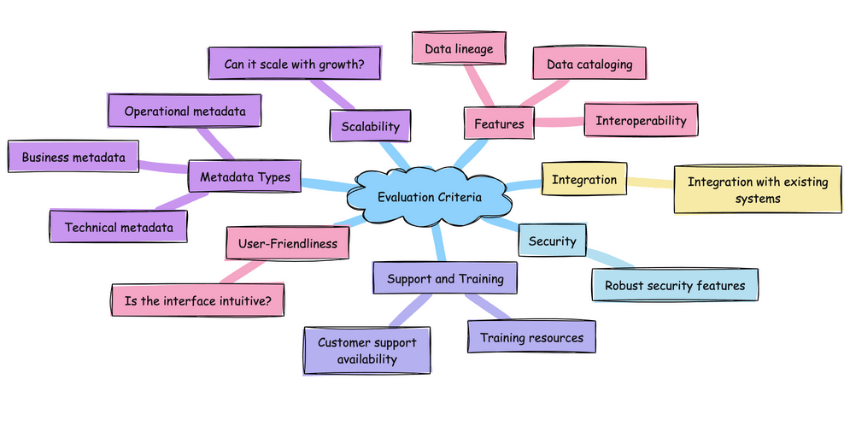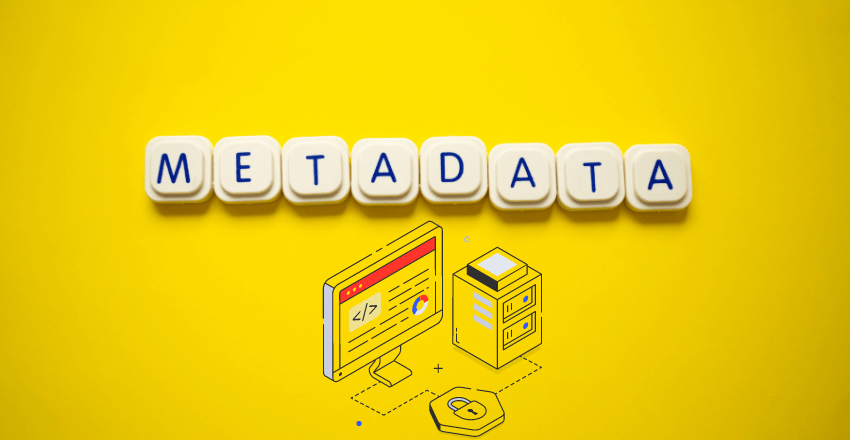Neglecting a robust metadata framework is akin to ignoring the foundation while building a house.
Despite being invisible and often complex, poor metadata management can lead to a Pandora’s box of tech issues, confusing developers and users alike.
Having worked with metadata frameworks in leading tech companies, I present a simple guide to understanding the importance of metadata.
Understanding Metadata and Its Importance
Metadata is often described as data about data. It summarizes basic information about data, making finding and working with particular instances of data easier. Metadata management is important because it helps you learn what data you possess, where your data is, and how it’s organized. It also ensures that only the right people have access to the information they need, and equips you to develop a robust metadata framework for your digital transformation.
Core Components of a Metadata Management Framework
A Metadata Management Framework (MMF) is essential for any organization aiming to establish a centralized and consistent view of data. Its primary objective is to establish a centralized and consistent view of data, enabling stakeholders to access, comprehend, and leverage data effectively.
This framework encompasses several core components that work together to ensure the effective management of metadata.
Global Metadata
Global metadata refers to the overarching metadata that applies across the entire organization. It provides a unified view and ensures consistency in how data is described and understood. This type of metadata is crucial for maintaining a centralized and consistent view of data, which is essential for effective data management.
Local Metadata
Local metadata, on the other hand, is specific to individual departments or business units within the organization. It allows for customization and flexibility, enabling different parts of the organization to manage their data in a way that best suits their needs. This component is vital for addressing the unique requirements of various stakeholders while still aligning with the overall metadata management strategy.
Document Types
Document types are another critical component of a metadata management framework. They define the structure and format of different types of documents within the organization. By standardizing document types, organizations can ensure that metadata is consistently applied, making it easier to organize, store, and retrieve information. This standardization is key to streamlining content management and improving data accessibility.
Building a Metadata Management Framework
Creating a metadata management framework is a critical step for any organization looking to enhance its data governance and accessibility. Essentially, a robust metadata framework empowers organizations to manage their data more effectively, making it a cornerstone of modern data governance.
Benefits of Implementing a Metadata Framework

When companies are in the process of migrating huge amounts of data, having a metadata framework at their service proves extremely beneficial. It helps people find files faster, share them across different departments, and enjoy a more manageable and secure experience with their documents.
Real-World Use Cases of Metadata Management Frameworks
1. Financial Services: Regulatory Compliance and Risk Management
In the financial sector, metadata management frameworks are extensively used to ensure compliance with various regulations like GDPR, SOX, and Basel III. These frameworks help in documenting the lineage and auditing of financial data, which is crucial for demonstrating compliance to regulatory bodies.
For instance, a large multinational bank might use a metadata management framework to track every data element involved in financial reporting, from source systems to final reports, ensuring that all data can be audited and validated.
2. Healthcare: Patient Data Management and Research
Healthcare institutions use metadata management frameworks to manage patient data, ensuring privacy, security, and compliance with regulations like HIPAA.
For example, a hospital could implement a framework to tag and track data elements across different systems—from patient intake systems to electronic health records (EHRs)—enhancing data interoperability and supporting advanced clinical research. Metadata management in this context also facilitates the aggregation of data for epidemiological studies, without compromising patient confidentiality.
3. Telecommunications: Network Optimization and Customer Service
Telecommunication companies leverage metadata management to optimize network operations and enhance customer service. A metadata management framework can catalog data from various network devices and customer interaction points, creating a unified view that helps in analyzing network traffic patterns, customer behavior, and service performance. This unified view aids in predictive maintenance, customer segmentation, and personalized marketing efforts.
Challenges and Solutions in Metadata Management

Metadata management can be a complex endeavor for any organization. It often requires a combination of various solutions, including metadata repositories, data modeling, data integration, and a data governance framework. Good metadata management ensures digital assets are properly maintained and can be discovered, integrated, linked, shared, and analyzed across the organization.
1. Challenge: Scalability and Complexity
As organizations grow, the volume and variety of data they manage also increase, leading to more complex metadata environments. The scalability of metadata management systems becomes a challenge when handling massive datasets spread across various data sources, both on-premises and in the cloud.
Solution: Automated Metadata Discovery and Integration Implementing automated tools that can discover, capture, and integrate metadata from diverse data sources is crucial. These tools should support scalability by handling large volumes of data efficiently and integrating metadata from both structured and unstructured sources. Automation reduces the manual overhead and potential errors associated with handling metadata, ensuring that metadata management processes can scale with organizational data growth.
2. Challenge: Ensuring Data Quality and Consistency
Metadata that is inaccurate, incomplete, or inconsistent can lead to poor decision-making and operational inefficiencies. The challenge lies in maintaining the quality and consistency of metadata across various systems and platforms within an organization.
Solution: Centralized Metadata Repository Creating a centralized metadata repository can help maintain consistency and quality across the enterprise. Such a repository serves as a single source of truth for all metadata, facilitating better management and synchronization. Implementing stringent governance policies and regular audits can further ensure that the metadata remains accurate and consistent over time. Tools that support metadata versioning can also help track changes and maintain historical accuracy.
3. Challenge: Integration with Existing Systems
Many organizations have legacy systems and various data management tools, each with its own metadata management capabilities. Integrating these disparate systems without disrupting existing processes or data integrity poses a significant challenge.
Solution: Middleware and Standards-Based Approaches Utilizing middleware solutions that can bridge different systems and manage metadata across them can alleviate integration issues. Adopting standards-based approaches, such as using common metadata frameworks and languages (e.g., ISO/IEC standards, RDF, OWL for web data) ensures compatibility and facilitates easier integration of diverse systems. Additionally, employing service-oriented architectures (SOAs) or APIs that abstract metadata interactions can enable smoother integration and interoperability among different platforms and applications.
Evaluating and Selecting Metadata Management Tools
Criteria for Evaluation

When evaluating metadata management tools, it’s crucial to consider several key criteria to ensure the tool meets your organization’s needs. First and foremost, assess the tool’s ability to handle different types of metadata—technical, operational, and business. Additionally, look for features such as data cataloging, data lineage, and interoperability. Here are some essential criteria to consider:
- Scalability: Can the tool scale with your organization’s growth?
- User-Friendliness: Is the interface intuitive and easy to use?
- Integration: How well does the tool integrate with your existing systems?
- Security: Does the tool offer robust security features to protect sensitive metadata?
- Support and Training: What kind of customer support and training resources are available?
Popular Tools
There are several popular metadata management tools available in the market, each with its own set of features and capabilities. Some of the most widely used tools include:
- Collibra: Known for its comprehensive data governance capabilities.
- Informatica: Offers robust data cataloging and data lineage features.
- Alation: Focuses on user collaboration and data stewardship.
- Talend: Provides strong integration capabilities with various data sources.
- IBM InfoSphere: Known for its scalability and enterprise-level features.
Integration with Existing Systems
One of the most critical aspects of selecting a metadata management tool is its ability to integrate seamlessly with your existing systems. Integration ensures that the tool can pull metadata from various sources, providing a unified view of your data landscape. When evaluating integration capabilities, consider the following:
- Compatibility: Ensure the tool is compatible with your current data sources and platforms.
- APIs and Connectors: Look for tools that offer a wide range of APIs and pre-built connectors.
- Real-Time Sync: Check if the tool supports real-time synchronization of metadata.
- Customizability: Assess whether the tool allows for custom integrations to meet specific needs.
By carefully evaluating these criteria, you can select a metadata management tool that not only meets your current requirements but also scales with your organization’s future needs.
Wrapping up
A Metadata Management Framework (MMF) is an essential tool for any organization aiming to optimize its data handling and accessibility. By systematically organizing, governing, and utilizing metadata, businesses can significantly enhance their operational efficiency and decision-making processes. The framework’s components, including global and local metadata, as well as document types, work in unison to create a robust system that supports quick and effective content management.
Implementing a well-structured MMF not only streamlines data management but also aligns with the organization’s strategic goals, ensuring that data assets are leveraged to their fullest potential.
Frequently Asked Questions
What is a Metadata Management Framework (MMF)?
A Metadata Management Framework (MMF) describes an organizational approach toward making data and metadata assets more accessible and usable to achieve business objectives. It mobilizes and expands existing resources that underly Metadata Management, in line with organizational needs.
What are the core components of a Metadata Management Framework?
The core components of a Metadata Management Framework include global metadata, local metadata, and document types. These components work together to help find and manage content quickly and efficiently.
How does a Metadata Management Framework benefit businesses?
A Metadata Management Framework improves data accessibility, enhances data governance, and streamlines content management. It helps organizations efficiently organize, store, maintain, and govern their metadata.
What steps are involved in building a Metadata Management Framework?
Building a Metadata Management Framework involves understanding how different departments and business users describe and organize their processes and content. It requires setting up global metadata, local metadata, and document types to improve content management.
What tools and technologies are used in Metadata Management Frameworks?
Metadata Management Frameworks use a variety of tools and technologies, including repositories, access portals, discovery and mapping tools, collaborative features, and analytical capabilities to manage metadata efficiently.
What are some common challenges in Metadata Management, and how can they be overcome?
Common challenges in Metadata Management include data silos, inconsistent metadata standards, and lack of user adoption. These can be overcome by implementing standardized metadata practices, ensuring proper training, and using integrated tools that support collaboration and consistency.
External Sources
https://dqops.com/metadata-management-framework-definition-and-implementation/
https://www.astera.com/type/blog/metadata-management/
https://www.castordoc.com/data-strategy/metadata-management-benefits
https://blog.purestorage.com/purely-educational/7-common-metadata-mistakes-and-how-to-avoid-them/













